Community
Candidate Keybo Taylor, talks about his run for Gwinnett County Sheriff [Podcast]
Published
5 years agoon
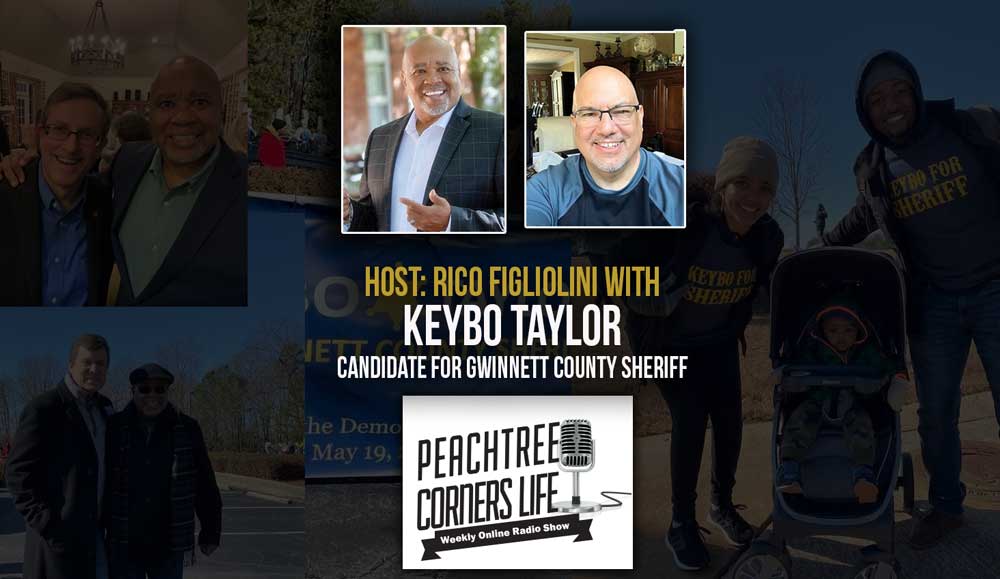
There are many candidates in the upcoming election for Gwinnett County Sheriff, so what makes Keybo Taylor different from the rest? Join Rico Figliolini as Keybo shares stories about his life in Gwinnett, his opinions, views, and ideas of what he will do if elected Sheriff. Recorded at Atlanta Tech Park in the City of Peachtree Corners.
Resources:
Website: https://keyboforsheriff.com/
Social Media:
@KeyboForSheriff
Facebook‘
Where in the show to find these topics:
[00:00:30] Intro
[00:02:31] About Keybo Taylor
[00:08:47] Keybo and Football
[00:13:25] Faith and the Campaign
[00:17:00] Details about Sheriffs and Police
[00:18:47] Sheriff Qualifications
[00:19:17] Why run for sheriff?
[00:23:30] Keybo vs. other candidates
[00:24:50] Sheriff’s department and ICE
[00:29:57] Attracting Staff
[00:38:44] Technological Advances in the Sheriff’s department
[00:41:54] Fiscally responsible decision making
[00:47:20] Closing
“You know, when you go back to talking about faith base, I think I’ve been moved in this direction for a long time, and I didn’t even know I was being moved in this direction…I believe I would say that it started with the Trayvon Martin shooting. So social media, drove some people out to make a lot of different comments about some things. And what I was seeing was people that were in law enforcement that were making statements and taking on a particular attitude that I just knew for a fact that that’s not the position that a law enforcement officer should be taking…So back in 2016, you know, we were having more and more incidents that were starting to come out. And I was very vocal about some things, you know. Very critical about some positions that I felt like law enforcement was taking. And it wasn’t just because of that, it was just things that I was seeing and hearing from people that held those positions. And I’m like, that’s not what this is about.”
Keybo Taylor
Podcast transcript
Rico: [00:00:30] This is Rico Figliolini, host of Peachtree Corners Life here in the city of Peachtree Corners. I have a special guest today, but before we get to him, I want to say thank you to Atlanta Tech Park for being a sponsor of this podcast. We’re here in Atlanta Tech Park in the city of Peachtree Corners. They’re like, think of them as an accelerator with an incubator. This is about 70 companies I’ve worked out at this location. Well, high tech, innovative type companies, and we’re right on the Technology Parkway, which is Curiosity Lab at Peachtree Corners, which is also another big thing that’s going on here. 5G technology driven through Sprint. Mobile technology, IOT, the internet of everything. This is just a great place for any company to be situated in this area and to be able to work with a lot of other innovative companies. Our lead sponsor is Hargray Fiber. They are, a business that crafts customized solutions for hundreds of businesses in the Southeast, and they deal with small businesses that are looking for affordable bundle services as well as enterprise level businesses looking for a full suite of managed it services. Hargray Fiber customizes their solution that works best for your business. So the new Peachtree Corners that we’re putting up. In other cities, they’ve worked B2B, business to business. And if you’re looking for a local fiber cable company to do your internet, your voice and TV solutions. This is a company that is, works on a local basis, but it’s in the Southeast. So now that we’ve done that, let me introduce our guest today. Keybo Taylor. Hey, Keybo.
Keybo: [00:02:12] Good morning. Good evening.
Rico: [00:02:15] Well, depending on when you’re listening to this, but Keybo here, is running, he’s a Democrat.
Keybo: [00:02:21] I’m a Democrat. That’s correct.
Rico: [00:02:23] We’re not hiding from that. So we’re, we’re running for, you’re running for Gwinnett County sheriff, right?
Keybo: [00:02:30] That’s correct.
Rico: [00:02:31] Excellent. So the whole idea of this podcast would be to know a little bit more about Keybo about what a Gwinnett sheriff does. What do you expect to do out of it? And to also find out a little bit about your philosophy. So why don’t you tell us, just tell us a little bit of who you are.
Keybo: [00:02:46] Sure, again, my name is Keybo Taylor. I always like to start out with the fact that I am a lifelong resident of Gwinnett County. One of the few that was actually born here in Lawrenceville, Georgia. Back when we had the old button going at hospitals. So that dates me up just a little bit about how old I am. I’ve lived here in Lawrenceville, you know, other than just the short period of time here, there’s four school, but I’ve lived here in Lawrenceville practically my whole life. It started with the Gwinnett County police department when I was 23 years old, fresh out of school, worked there for 26 years, had a very colorful career, I would say. Yeah,
great career. Wouldn’t change anything about it for the world. I retired from the Gwinnett County police department back in ‘09, 2009. But while I was there, I had the opportunity to work. 14 years of the 26 years I was there I worked in, I spent them in special investigations, where I worked. Everything from, you know, narcotics type crimes, organized type crimes, things such as that. And, got to spend some time as the narcotics unit commander. There is a Lieutenant, and then I retired as the, as a Major out of one of the precincts. But I also retired as well as the first and only at that time, the highest ranking African American in that, in the history of the Gwinnett County police department.
Rico: [00:04:24] And a police department that really is not, maybe today it is, but it wasn’t too diverse back then. Wasn’t?
Keybo: [00:04:30] No, it wasn’t there, the diversity, I don’t remember us having any Hispanics there or Asian officers at that time. There were three other African American officers that was there to pull, what the police department at the time. But I was hired on. So, when I started, we had a total of six.
Rico: [00:04:55] Out of?
Keybo: [00:04:56] probably at that time we were probably about 150, 150, maybe 200 men in the department.
Rico: [00:05:05] Men, women came way later.
Keybo: [00:05:07] There had been women, yeah, I’m not trying to be one sided with it, but, 200 it was probably between 150-200 sworn officers that was there.
Rico: [00:05:23] And you went, you said you went to Central Gwinnett high.
Keybo: [00:05:26] I graduated from high school here in Lawrenceville.
Rico: [00:05:31] And you’re wife Linda?
Keybo: [00:05:34] My wife, Linda, she is from Dacula. Interesting story about her. I met her in the first grade. First grade, that’s correct. That was before they had actually integrated the, the school system here in Gwinnett County. So we all started a school in the first grade at Hope or Renwick, a school, which is in Lawrenceville. So she was bused over from Dacula and of course, what goes in Lawrenceville, and that’s where I actually…
Rico: [00:06:08] They brought your wife right to you.
Keybo: [00:06:11] Little did I know in the first grade that that’s how it would be.
Rico: [00:06:14] Wow. And you have it from two children.
Keybo: [00:06:17] We have two kids. Kesha and Justin. And, my daughter in law, which is also my daughter, Christina, and they have two kids. And, and, we’re looking for a third one to be on the way here soon.
Rico: [00:06:31] You’re looking, I’m assuming they’re looking also, right?
Keybo: [00:06:33] They’re looking also.
Rico: [00:06:36] That’s cool. It’s good to have, I’m waiting for, I won’t have grandkids for a while. I think they keep telling, my kids keep telling me they’re not going to have kids, so.
Keybo: [00:06:43] I’ve heard that, really. So let me tell you how quickly it changed. I heard that too. And then the next thing I heard when he got married, they came in, they told me they wanted five kids. I said, okay. I was hoping for three, but you know, let’s see, y’all five comes out for you, but if you give me five and bless me with five, I’m okay with it.
Rico: [00:07:04] They were shooting for the moon.
Keybo: [00:07:06] And let me tell you, they keep you young though.
Rico: [00:07:09] And then they’re the ones that you really want to protect.
Keybo: [00:07:12] That’s correct. One of them. Kristen, I called him my campaign manager. If you ever go onto my Facebook, you see pictures where we had the Kings day parade back here this past Monday. And he was out with me, and he was, I think he had more fun than you know, just about everybody else out there. But he got to ride in the car, got out of the car, passed out a handout, lists and things such as that. But we had a great time.
Rico: [00:07:41] That’s cool, that’s a great way to bond with kids.
Keybo: [00:07:44] Let me tell you. It is, it really is.
Rico: [00:07:48] And you, your educational background. Just to tally through some of the stuff in your background, you went to Mercer university?
Keybo: [00:07:55] I got my undergrad at Mercer, criminal justice. Got my master’s degree from Columbus State University in public administration.
Rico: [00:08:04] Cool.
Keybo: [00:08:07] May I also say something else too. Yeah, I’m a, I’ll always like to throw a couple of other things in. I’m a proud graduate of the Georgia command college class number 10. And, also, the DEA Drug Commanders Academy out of Washington. So yeah.
Rico: [00:08:29] A lot of experience, that’s for sure.
Keybo: [00:08:31] Thank you.
Rico: [00:08:32] A lot of street experience I imagine too.
Keybo: [00:08:34] I spent nine years as an investigator. Nine of those 14 years was actually working cases, so yeah.
Rico: [00:08:40] And I imagine the stories you can tell that you have from that. Did you play football?
Keybo: [00:08:46] I did.
Rico: [00:08:47] Did you enjoy playing football? I remember that was a while ago. So it’s not like people worry about concussions, that one stuff.
Keybo: [00:08:54] You know, I tell people back in the old days when I played and I’m dating myself again, you know, when you came off the field, if you didn’t have that transfer, a paint on your helmet, that was a sign that you didn’t do anything. So, you know, the more paint that you have from your opponents helmet on the yours is so that you had a better game. So, but no, we didn’t really worry too much about that back at the time. But let me tell you what it did for me. Of course, I enjoy playing and you know, I’m dealing with, you know, bad knees and backs and everything else now. But what it did for me was right out of high school they had started an eighth grade program here in Gwinnett County, and I get a call from a guy one day by the name of Dick Hodges, and he called me up and told me, he said, look, you, you know, I just got your, you know, your information from, your head coach over at the high school, Talley Johnson. This is right after I graduated. And I’m like, okay, you know, what is this about? You said, I want you to come on and coach football with me. And I’m like, you gotta be kidding me. You know? Cause I felt like I said, you know, when I was playing football, I couldn’t even hardly remember the plays out there. You know, you’d be so nervous out there on the field, but, but let me tell you, it was the start of something very profound in my life. I started coaching, on the eighth grade staff with this guy. And, I’ve coached little league football in high school off and on since 1979. Any time that I had the opportunity between that to actually get out there and be involved, you know, with these kids, with these youth, you know, I’ve done it. So, you know, sometimes I’ll look at it as is my ministry. Sometimes I’ll look at it as just my calling.
Rico: [00:10:50] Have you found kids changing over the years that the fact that you’ve done it so long cause you found that the attitudes changing a little bit?
Keybo: [00:10:57] Oh yes, yes. You know, I’ve coached kids, kids of kids that I coached, you know, in a couple of situations I’ve had the grandkids of, you know, of a player that I’ve had. You know, you’re really just a little bit here, but, but the thing of it is, is that you do see there has been a change and, you know, that the one thing that is constant in life is change. From generation to generation with these kids. You have to be, you know, an agent of change is what I call it. I don’t know what anybody else would call it, but you know, you have to help people through change and you have to be willing to change and modify what you do yourself. You know, I know that some of my tact is out there. This, I coached this last year and I posted on 11 year old group. And one thing that I noticed is, is that, you know, I really. You know, had to start to change my ways too, you know, and I’ve always been a little resistant to change, but this past year, I coach with my son and he was more of the easy going guy, you know, and I was still that, you know, the one that was, you know, this whole rough guy out there. But let me tell you, when those kids, man, you know, they show you so much love. And that’s the one thing that I, you know, I’ve seen that is that, it’s more so today than it was when I first started. They require more, they require more love, and they’re not, they’re not ashamed or reluctant to show you back love, you know? It’s, you come in the practice, Hey coach, how you doing? You know, how was your day today? You know, and they would ask you how your day was. And you know, I don’t know if they were doing it just because the parents had told them that was a good thing. But yeah. But some of them, you know, it’s, it’s legitimate and it’s like they cared about you, you know, and how you were doing. A short story and I know I’m getting off on a lot. We’ve got a long way to go, but, I, I was having some bad knee problems out there and I was coaching with a cane this last year and they would come, how are you feeling today, coach? You know, how’s your knee? You know, it’s like, it hurts, man. You see me, you, you know, walking and limping out here and hurt. But, but, probably one of the best experiences I’ve had with that.
Rico: [00:13:25] It’s a good thing they didn’t tackle you on the field that would’ve been bad. So let’s, let’s go down that a little bit. And you have, countless churches, missions and pastors have endorsed you. So, you know, big question. You know, I come from Brooklyn, I’m a Brooklyn Tavin Catholic, came down to the South, became born again Christian, breaking Democrat or Reagan, although I’m not Republican. Right now, I’m agnostic to some degree, and I will choose my, my, my, poisons better. But, faith, especially in the South, I find faith that drives a lot of things. So how does faith work for you in what you’re doing?
Keybo: [00:14:14] I am very strong in my faith. I was raised Baptist. We kid about the fact that, when I was coming up, man, we spent some days on Sundays, all day in church, and you know, but it should foundation. And one thing that, no matter where I’ve been, whatever is going on with me, my faith has always been what has guided me. Sustained me, you know, lifted me up. Brought me through some things, man, that I didn’t think I was going to be able to get through. I always tell the story that when it was left up to me, I could’ve really put myself on a bad path.
Rico: [00:15:01] We all feel the same sometimes.
Keybo: [00:15:02] But I also knew too, that it was my faith that brought me back. So when I got started with this one thing that we talked about, what we were, you know, sitting around talking about what does this look like? What is it that we’re trying to get accomplished? And no matter where we went, whatever we did, who we talked to, it always came back to how you connect with the community. And what I’ve always known, man, is the people that have their ear to the ground, that knows what’s going on in the community, that can connect with the communities of faith based leaders. So we, we set it up to where, you know, we reached out to, you know…
Rico: [00:15:52] Some of the individual pastors?
Keybo: [00:15:54] Most of the, a lot of the individual pastors, cross faith, you know, and, and when we would talk to them and ask them, you know, what is important to them, you know, I didn’t go in there telling them, you know, what was important to me right? I asked what was important to them and almost to the man or woman, it always came back to, it was how law enforcement interacted with the community. You know, especially out there in parts of the community that never saw law enforcement unless they were coming in, you know, for a negative reason. So, that’s what we did is we talked about partnership and in with, you know, faith based leaders. You know, I gave them my word that, you know, when I, when you know that this partnership won’t stop, you know, we’ll continue to have these conversations and make sure that, you know, that I’m doing my part from the Sheriff’s department to make sure that, you know, we give a better light or a more positive light of law enforcement.
Rico: [00:17:00] So let’s go down that road a little bit because most people might not realize what a sheriff really does. So, so why don’t you help us out a little bit. So as far as, what’s the difference, let’s go through this fairly quick just to educate a little bit. What’s the difference between a sheriff and a police chief or a sheriff and police?
Keybo: [00:17:18] Okay. Police chiefs. All your, most of all of your police departments here in the State of Georgia is mandated by either a council or commission. Here in Gwinnett County, it is, they’re mandated by the, they answer to the Gwinnett County board of commissioners. So the police chief is actually hired by the board of commissioners and their function is, is for law enforcement. You know, investigative…
Rico: [00:17:46] Felonies, murders?
Keybo: [00:17:48] You know, whatever. Yeah, investigating all types of crimes, traffic control, at some calls, you know, responding to accidents, that type of thing. Sheriff’s department is constitutional position. And basically what the mandate of the sheriff is, is to run the jail. Secure the courts and to serve warrants and civil papers. Those are the main functions of the sheriff. But one thing about it is, is that the sheriff has a lot of other discretions of other things that you can do outside of those mandates, you know, providing that your budget and your manpower, you know, allows or permits you to do it.
Rico: [00:18:37] We, as far as the boundaries of the Sheriff’s jurisdiction, would be what? Well, I mean, you’ve already stated it, statewide.
Keybo: [00:18:45] Statewide, that’s correct.
Rico: [00:18:47] Qualifications to be a sheriff?
Keybo: [00:18:50] You have to be post certified, I believe, or get your post certification within a certain time period of you being elected. You have to go through the process or record, you can’t have felonies or, you know, those type of things. Then you go through the election process and if you are elected, then you, there’s some other training that you’re mandated to go through.
Rico: [00:19:17] All right. Let’s get back to a little bit to why you chose that you want to, I mean, you’re retired, you’re doing football. I mean your life could be a little easier. Why do you want to be sheriff?
Keybo: [00:19:29] You know, when you go back to talking about faith base, I think I’ve been moved in this direction for a long time, and I didn’t even know I was being moved in this direction. You know, just. You know, you kind of navigating through life. I was happy, you know, I was happily retired, got out and got to do some things that, you know, I had always wanted to do. Tried coaching football at a higher level that, you know, more of a professional level. You know, we own a, a fitness business on the side too. So, you know, I’ve got to dibble and dabble in a whole lot of different things, a lot. But what I was seeing was. Saw some things taking place, started, I believe I would say that it started with the Trayvon Martin shooting. So social media, drove some people out to make a lot of different comments about some things. And what I was seeing was people that was in law enforcement. That was making statements and taking on a particular attitude that I just knew for a fact that that’s not the position that a law enforcement officers should be taking. Sheriff Conway made a statement and I think he, well, I don’t think, I know. He called, made a statement about, Black Lives Matters being a terrorist group. So he and I had a conversation about it and, and, you know, I was just like, you know, look, you’re the sitting sheriff. You know, if that is your thoughts, initial thoughts, but you know, you’re the sheriff for everybody in this community and, you know, to make a statement like that is not helpful to what this situation is as the, what it calls for. So back in 2016, you know, we were having more and more incidents that were starting to come out. And I was very vocal, you know, about some things, you know. Very critical about some, some positions that I felt like law enforcement was taking. And it wasn’t just because of that, it was just things that I was seeing and hearing, you know, from people that was, that held those positions. And I’m like, that’s not what this is about. You know? So what I did was I organized, a prayer vigil up at the courthouse. This was in July of 2016 and what we did was, we brought in, you know, clergy, faith based leaders, law enforcement, and we got them together. We did a prayer vigil up to the court, the justice and administrations, on the grounds there. And what we did was, after they pray for each other, you know, we took that opportunity for everybody to meet a police officer. You know? And what was profound about it was, you know, I knew some people, man, they brought their kids up
there and they were telling me, you know, Hey, look, my kid is afraid of the police. You know? I said, well, this is an opportunity. And they got to see these police officers for who and what they really were. You know, they are people every day out here trying to do a job. You know, just trying to get home to their families and they were wanting to do the right thing. So from that, and I know that that’s a long answer, but you know, when you asked me, you know, that’s, that was the beginning of it for me. And it wasn’t until maybe about January last January, December, January, people were approaching me about running and, I finally made up my mind around about January that you know, that I would do it. So here we are.
Rico: [00:23:16] And it takes a lot of steps, obviously, I think family and consideration with the family and stuff.
Keybo: [00:23:21] It does. It helps to have the support of your family.
Rico: [00:23:24] Yes. More before anyone else’s endorsements.
Keybo: [00:23:28] That’s correct.
Rico: [00:23:30] It’s a crowded field.
Keybo: [00:23:32] Yes, it is.
Rico: [00:23:33] So, you know, being that it’s a crowded field, what would you, you know, what differentiates you from, from the rest of that field?
Keybo: [00:23:40] Well, all of my opponents bring certain things to the table, you know, in terms of education, in terms of experience. What makes me different is my connections with Gwinnett County. My roots are here in Gwinnett County. The things that I’ve done outside of law enforcement is what sets me apart. You know, I can work across the owls with Republicans, Democrats, anybody, all social groups, racial groups. I just had that experience that, you know, what I have done and you know, the connections that I made, it just makes me what I believe to be the stronger and the best candidate. And, you know, when we talk about, all of us talk about similar things. So what we want to try to get accomplished out here, but you have to be able to build those relationships, maintain those relationships, and have the confidence of, of the people that you’re trying to build these relationships with if you’re going to be successful out here.
Rico: [00:24:50] For sure. The, so you do have a lot of candidates out there running and everyone has different issues that they’re. Issue, if you will, to a degree. You’ve been talking a little bit more, about collaborating with the DA, the police departments on the, using his existing task force, not necessarily creating new ones, but collaborating with them on their task force, with violent crime. But you’ve also mentioned mental health.
Keybo: [00:25:19] Such as something to that. I’m not opposed to create a new task force. As I stated earlier, you know, I was the commander of the drug task force. So I understand the importance of task forces. And what I didn’t mention was, was that, I was also assigned to the FBI drug task force for a period of time. So I understand the importance of task force and, if we’re going to get some other things accomplished when you don’t have, you know, the manpower. If you don’t have, you know, the funding task forces other ways to go.
Rico: [00:25:57] So Sheriff’s department can work with them.
Keybo: [00:25:59] We can. I can, yeah. I’d already said that long before. I hear now that the governor’s talking about human trafficking, but when I first started, as I talked about taking people that are participating in the, in the two 87G program, now, taking them out of that program and, and assigning them to. You know, any type of federal task force or a local task force that deals with human trafficking.
Rico: [00:26:22] And two 87G for those people that may not know, has to deal with the ice. Taking illegals off the street, arresting them, and you’re doing such, your local police doing ice work without getting paid for it. But using local police to be able to, to do federal work.
Keybo: [00:26:42] That’s correct.
Rico: [00:26:43] Which causes problems. Also locally. I mean, I know some people say, well, they’re illegal. They should be removed, but 12 million illegal aliens in the United States. I mean, you know, not, they’re not all going to be shipped home no matter how anyone looks at that. It’s just never going to happen.
Keybo: [00:26:59] That’s not going to happen.
Rico: [00:27:00] And they, a big part of not only the economy, but of our community. You were talking about. So you can, you know, I’m sure there were kids that may have been from illegal parents that were playing football, you know, that you might’ve dealt with.
Keybo: [00:27:12] Absolutely. No, absolutely.
Rico: [00:27:14] They are people, right.
Keybo: [00:27:17] And you know, some of the kids, I didn’t even know that they were coming from an illegal parent situations like that until I got into this race. Some of the best kids that I had. You know, that their parents said, you know, came here and they were not documented here. And, and, you know, and I’ve spoken to some of them and I talk about how the hardship of it was, I didn’t even know it, you know, I mean, I was gone. I had gone on back to doing my own little thing and then even know what those situations was really about. But basically, you know, immigration is a federal, it’s a federal law. It’s a federal issue. And you know, somewhat. People
talk about what, you don’t want to enforce the law. It’s not that I don’t want enforce the law. I’m going to enforce what is mandated by the state of Georgia, you know? And that is not mandated by the state of Georgia. That’s an agreement that the current share of Butch Conway entered into with ice.
Rico: [00:28:15] And that’s also a volunteer agreement, right?
Keybo: [00:28:17] Yes, it is.
Rico: [00:28:18] So we don’t have to, Sheriff’s department does not have to enter that. Then of course, tend to, they chose that to that agreement.
Keybo: [00:28:25] You look at, I think, at last count there was 90 agencies in the nation that participated in two 87G. That’s 90 agencies, 90 agencies, and three of them that I’m familiar with is here in the state of Georgia. Maybe more, I had heard that there was as many as five, but I can, you know, tell your authority. That tells you that it’s not a mandated thing. It’s a, it’s an agreement by choice.
Rico: [00:28:58] That doesn’t stop, you know, if, if, if the police arrest where you serve in your arrest an illegal that committed a felony, they will be deported. I mean, that’s just the nature of, they will, you know, you’re not talking, we’re not talking about felons necessarily, the majority of who was picked up on enough felons. They’re not criminal offenders. you know, traffic ticket. Everyone gets traffic. I got a traffic ticket once. I mean, I was going for the $3 Starbucks. I ended up getting a $100 a ticket. Five miles over the speed limit and it was shot down to 30, but whatever.
Keybo: [00:29:33] I always say Starbucks is expensive.
Rico: [00:29:37] That day it was very expensive. But, so, so that would be one of the things that you would, if you were elected sheriff, that would be one of the things you would remove.
Keybo: [00:29:46] I’ve always said that will be one of the first things that I would do is just, you know, take, the Sheriff’s department out of that particular agreement with ice.
Rico: [00:29:57] Okay. The, the, some of the other things that you talked about also is, and I, and I see there’s a problem with like, businesses hiring people. There’s ghost employees. There’s not enough people to work, restaurants and stuff happening all the time. How would you attract and retain qualified niches, qualified staff at their first staff that represents the community. How would you do that? Are they enough people to do that with?
Keybo: [00:30:20] Of course. And I may get in trouble for saying this, but I’m gonna go ahead and say it. You know, we talk about, you know, how low, the unemployment rate is today, okay? And they boast about the fact that you know that there’s jobs here, but you’ve got to ask yourself
what type of jobs are there? You know? And when you see people at a certain level that they’re working two jobs and they still can’t make ends meet, well, it’s good to sit in here and boast about the fact that I got jobs. But you know, they’re not making a decent livable wage on what they’re doing. That is Sheriff’s departments nowhere near. And that is, that’s been legendary ever since I’ve been in law enforcement starting in 1983. But you see, you know, one thing that they would come back and talk about, what we did a study and the study says that, you know, money is not the most important thing. You know, good work environment, good supervision, good, you know, and they would give you a laundry list of all of the goods. And somewhere down towards the middle of the bottom is salary. And benefits, which, you know, and I was like, you know, I said, no, you know, I’m a person out here. You know, when I started with the County police department, I was making less than $13,000 a year. So money and salary was important. You know, especially when I started having kids and I was like, no. So what I say on that is, is that, you know, when you look at, and right now use the city of Atlanta is, as a comparative agency. You know, the city of Atlanta right now have a waiting list of people trying to get into the city. And what happened was the mirror changed their, their benefit package there. So Atlanta is one of the highest paid agencies in this area. Gwinnett county’s at the bottom. As larger, you know, and as good as this County is, we’re at the bottom. If we got some of them on, it’s fine. As officers and deputies in the nation, these, these are, some of them was fine as individuals. You’ll ever see everyone across, you know. And I know that there is, bad things that happened from time to time, but for the most part, they deserve more. So in order to get them, the best. You got to give them the best. So we’re going to have to look at these benefit packages. I hear what we’re paying people.
Rico: [00:32:45] This is true. What I hear that when a police, for example, they train through the police Academy is employees or people. That would eventually be police officers. But then one Sunday, after a year or two, they leave and they, after they get some experience, they get the schooling. They leave and then go to other counties that have insurance. So we can’t retain them.
Keybo: [00:33:07] Our retention races, you know, when you talk about, you got over 150 vacancies.
Rico: [00:33:15] So you have the budgets. Supposedly there’s budget for it and they can’t fill the spot.
Keybo: [00:33:19] You can’t fill it.
Rico: [00:33:20] So you would think the money’s there, you can’t fill it. So maybe you should pay a little bit more, reduce the amount of they can see, and then you probably should be able to fill it.
Keybo: [00:33:29] We could, but I think it’s gonna take more than just a little bit. We’re going to have to seriously consider changing what we’re looking at as far as the benefit package.
Rico: [00:33:42] These are like to me, law forces at the same way. To me, print stories where people that are in. Well, the services, and they still might have to get food stamps. They may still have to do, other services from the federal government to help them meet and speak in homes with the sheriff police, fire. They’re all in harm’s way. I don’t understand why we can sit there and try to pay them less.
Keybo: [00:34:10] I think we as a society is looking at a lot of things socially wrong. We don’t take care of who and what we should be taking care of. There’s no reason why, you know, a veteran should have to worry about being homeless, you know, finding affordable housing or, finding good quality health care.
Rico: [00:34:38] It’s almost a joke. They know that it’s bad.
Keybo: [00:34:42] So when we sit down and what gets me is people, man, they want to put up this front showing how patriotic that they are. But yet, and still, you know, we got people out here and they want to, you know, Oh, it’s so sad that we have, you know, that some police officers out here committing suicide. Well, you know, what, what are we doing to change some of the things others in addition to the outside pressures that they have to deal with on a day to day basis. So you take a person and you put them in theater over there on ward, then he comes back, he’s got to worry about. You know, we’re spending, there’s no live. I mean, we, we fundamentally have this thing wrong. And you know, and when we look at. You know, even a healthcare situation, you know, and, even for Gwinnett County, and I know I’m gonna get in trouble for saying this, but I’m gonna go ahead and say it. You know, in other countries, they take care of the elderly, you know, they, they make sure that they’re taken care of. Here, it’s almost like they don’t want to, you know, once you retire, they don’t want to take care of you. So they make, you know, your health care so high, you know, and other things, you know, they’re specialists of it, you know, and it’s just like. I put my time in, I’ve, you know, have served this County or this country and here we are. Now, you know, that I need, and there is nobody there for you.
Rico: [00:36:06] So it’s amazing that we constantly do this, not only with our military, but with the police and fire and even teachers. I mean, these are people that protect us.
Keybo: [00:36:18] That’s correct.
Rico: [00:36:18] In the, spend more time with our children than we do the escort. And yet we don’t treat them willingly.
Keybo: [00:36:25] And we don’t.
Rico: [00:36:28] I’m sorry. We can see that. Sorry. It’s just like.
Keybo: [00:36:31] This all falls outside of the rails of the Sheriff’s department, but you know, but it’s still real, you know? And another thing too, you know, if I’m elected sheriff, I want to work with the board of commissioners. And you know, if you got people coming into Gwinnett County that wants to, you know, develop homes, okay, what’s wrong with a certain percentage of those homes being set aside for law enforcement at a reduced rate that we can afford?
Rico: [00:37:03] You know, that’s interesting cause I heard someone else talk about doing that with developers, having them, if they’re going to ask for rezoning, right? The high intensity that this should really, because everyone talks about affordable housing, but the real trick is how do you force that into the marketplace? Cause there are expensive places to look in. The property is going to be expensive unless you, unless government can do something about it and the worker that’s going to be working, the, your police force, you know, locality, like Bobcat can’t live in Bobcat. They might be coming from coming maybe with somewhere else. You know.
Keybo: [00:37:40] I know that they have somewhat of a pilot program like that that’s going on over in the city of Atlanta. But you know, what I’m talking about is, you know, being able to be, you know, more diverse than more than different communities. So, not just then. You know, an identified area, but anywhere that you know that you have a development that you know, we can look at, you know, getting officers there because you know, it’s safer. It’s a crime deterrent to have either a patrol car or a deputy’s car or, you know, just folks knowing that, Hey, there’s a, you know, law enforcement on the, in the community, you know, that’s, that’s worth the money of having security there.
Rico: [00:38:32] For sure. And most police drive their own cars home and stuff.
Keybo: [00:38:35] In Gwinnett County, the police officers doing most of the, not most of the deputies, but ones that are signed in certain areas drive their cars.
Rico: [00:38:44] I had last about six, eight months ago maybe. I had the, last year actually I was, I spoke to a couple of witness superior court judge candidates, and we talked about technology in the courtroom. That would really make things work faster, especially if you have, you, if you could do sort of a FaceTime type of deal where you don’t have to come down to the court. All we’re asking for is a disposition of moving things through a different date. There’s no reason to take up court time for that. Okay. How would technology the internet, the approach to law enforcement in the past decade. Do you think that the Sheriff’s department has gone far enough with the use of technology, or has it, or, or has it not? I mean, what would you do there with that?
Keybo: [00:39:31] One thing that I did have a discussion with, it was about the wait time that attorneys have the have or use, at certain times over the jail waiting to see clients. And part of that is because of the shortage of manpower at the jail or maybe other things. But they talk about a wait time. Some of them talked about it up to three hours. I haven’t had to wait before they can get in and get the interview of the client. One thing I would like to take a look at as far
as technology goes is, is that if there was a system, a secure system, but what we could put a client in front of a camera or whatever it would be, and remote, that car, you know, the interface with their attorney so that the attorney would have a set block of time, you know, at three o’clock on Friday. I know I got a time, you know, I have my candidate, you know, in the pot so that he can, you know, we can have, the secure conversation, secure conversation, and I could, you know, then this interview with my client, that’s a time saver.
Rico: [00:40:43] Now with that, obviously there’s some complications there for privacy and whether that recording is deleted later and stuff and not used for law enforcement than.
Keybo: [00:40:54] It wouldn’t be necessarily a recording. It’s not a recorded video conference.
Rico: [00:41:00] Do you see any other uses online uses or do you see more online crime that the Sheriff’s department may have to deal with?
Keybo: [00:41:08] I don’t know, as far as what the Sheriff’s department itself would be. I will like, you know, take a look and make sure that, you know, we have, you know, up to date technology as far as, inside of the jails, especially in the courthouse. You know, courthouses are becoming more of a target for, you know, certain, certain things. So, you know, you want to make sure that your technology is up to par there, technology around the courthouse, so that you can get, you know, more real time information in the event that you do have an incident either at or around the courthouse. Yeah, I do see a greater need for technology.
Rico: [00:41:54] Okay. It’s, it’s interesting in the city of Peachtree corners, for example, is putting in, license ID cameras and also facial recognition cameras. Just to be used to be retained. To possibly be used in case there was a felony act or something like that in the community. So it is getting more of a, of a cyber, you know, having cameras out there and, and, being able to track things. Fiscally responsible decision making, reducing costly lawsuit liability. That’s one of the things that you, you, you spoke about it. How would you speak to that then? As far as that?
Keybo: [00:42:37] A lot, I don’t know if you looked at the news, but back here a few days ago, Randy Travis was reporting on, on a case of a lawsuit where a deputy was just arrested by the FBI, and he’s being prosecuted federally, for force, excessive force on an inmate, a mentally disabled inmate inside of the jail. One thing that he talked about was, was that he had checked on the calls because there’s, there’s so many. I think right now we’re up to about 75 plaintiffs. That’s involved in a law, in lawsuits over there at the Sheriff’s department for either excessive use of force, wrongful death, and there are some other ones. I don’t know what the other titles are, but I do know right about now you’ve got about 75 plaintiffs that that’s a, that’s a tremendous number of people.
Rico: [00:43:31] And worse than has 250 odd people, right?
Keybo: [00:43:33] So, well, or no, no, I think, yeah, they got almost a thousand folks. Yeah. But see, here’s the deal. You know, when you look at not only the calls that, it’s costing the County attorney’s to defending his lawsuits. You also bring in outside attorneys, and Travis reported that he checked back in August and at the time, back in August, the amount that the County has spent on these lawsuits. Outside attorneys was over $500,000 so that’s what, six months ago, almost six months ago. So you know that, that tab is rolling. We spent millions of dollars out here defending these lawsuits, and then if we lose, then you’re paying out multiple million dollars to these plaintiffs. I hear, and it starts from the top, you know. When those lawsuits first started, he did nothing to change the practices of that rapid response team that was operating inside of that jail.
Rico: [00:44:45] So you’re saying possibly training?
Keybo: [00:44:48] Oh, well, first of all, it starts with your hiring. Who do you have? Who do you have in charge? As a sheriff, who do I bring in and who do I put in charge? And, what is the mindset and the philosophy that we’re going to go at and how do we deal with conflict and how do we deal with, you know, with people, man, that are, that are you know, combative or mentally challenged in there. You know, when you look at it, probably 85 to 90% of the people, that is incarcerated, you know, they have some sort of mental disability. You know, you think about who goes into a jail and start fighting. So, you know, we’ve got to have a better screening process of folks that are going in, you know, if there are services that we need to provide to people, you know, as far as putting them in special areas, you know, we’ve got to train our deputies better with, you know, more a CIT training and crisis individual type training.
Rico: [00:45:45] Then that doesn’t this also come back to paying more money to paying the right salary base to attract the right candidates?
Keybo: [00:45:52] It does, but you know, even to get those salaries up to par and to get the right people in, you know, you’re talking about, you know, three to four years. So it may take a whole term to get that, but what I’m saying is we have to change the culture of that place immediately. They want, I’ve got to have a plan going in there to how we’re going to reduce and how we’re going to deal with conflict resolution inside that jail. How do we deal with a physical force? How do we report physical force? When do we use physical force? And how do we evaluate fairly if we’re using proper force. So I can’t, you know, some people will sit there and say, well, you know, you got, you know, it’s going to take you time. Well, yeah, you’re right. It is going to take time, but I don’t have time to sit back and wait until some of these things take care of themselves. We’ve got to have a plan from day one going in the door. What are we going to do?
Rico: [00:46:50] How long is the Sheriff’s term?
Keybo: [00:46:52] Four years.
Rico: [00:46:53] Sounds like a long time, but.
Keybo: [00:46:55] It’s in the blink of an eye. Yes. Would be like, especially when you get our age, man, four years go by real quick.
Rico: [00:47:02] Especially when you’re on a mission and you want to change things. Four years may not be enough time to do it.
Keybo: [00:47:07] Well, I plan hopefully, you know, my plan is, is to bring the right people in, from the start and, you know, people that I’ve got the confidence that it’s going to hit the ground on it.
Rico: [00:47:20] We’ve been with Keybo Taylor talking about his run for sheriff, his background, where he’s grown up, who he is and his faith. And I’m glad to have you on here. I appreciate you coming out. So why don’t you, I normally do this on candidate interviews give, give us a two minute, two minute thing, a two minute elevator speech to go ask for that vote. Tell us why we need to vote.
Keybo: [00:47:47] For sure.
Rico: [00:47:49] And tell us when the election is, all that.
Keybo: [00:47:52] You know. One more time, man. My name is Keybo Taylor and I’m running for sheriff of Gwinnett County, the election I have a primary okay. The primary is in May, May the 19th, 2020 this year. I’m asking for, I need your support. I need for people that if you believe in what we’re talking about, and if you want to get behind my campaign, go onto my website, go to my social media pages. If you like it, please repost it. Spread the word out as best as you can. What I tell people is, is that, you know, if you support me, find me 10 more people. And then ask those ten people to find me ten more people, you know, you know, it’s kinda like the old chain letters, man. We just gonna keep it going. But you can find my information at Keybo For Sheriff and you spell out for sheriff.com. KeyboForSheriff.com. Then, I’m also on social media. I’m on Facebook, I’m on Instagram, and, I believe you might even be able to find me on Twitter. I’m not really sure about the Twitter.
Rico: [00:49:14] I know Facebook and Instagram for sure. I’ll tag you on that one, great. We’ve been with Keybo Taylor, I appreciate you coming out. Keybo thank you, and good luck with getting the word out and telling your story.
Keybo: [00:49:27] Thank you very much. Thanks for having me.
Rico: [00:49:29] Thank you.
Related

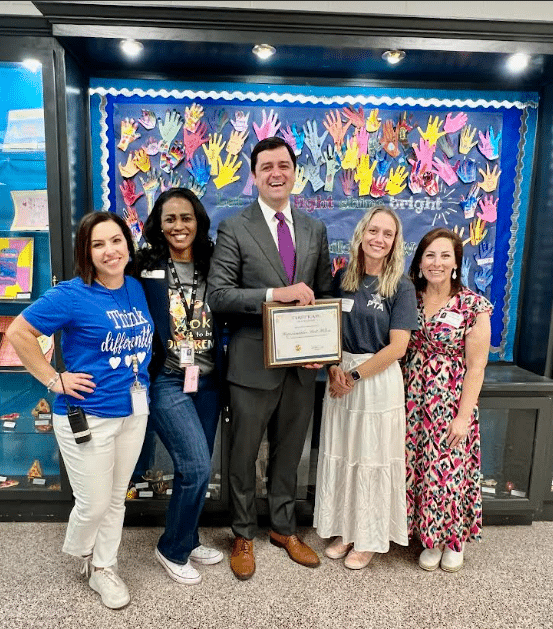
Simpson Elementary School celebrated Exceptional Children’s Week (ECW) last month with five days of special activities to recognize their special needs population and all of their exceptional students.
April 14–18 is set aside each year to celebrate children with disabilities, gifts and talents. This year’s ECW theme was Bridging Gaps and Building Futures, and the school was happy to take part.

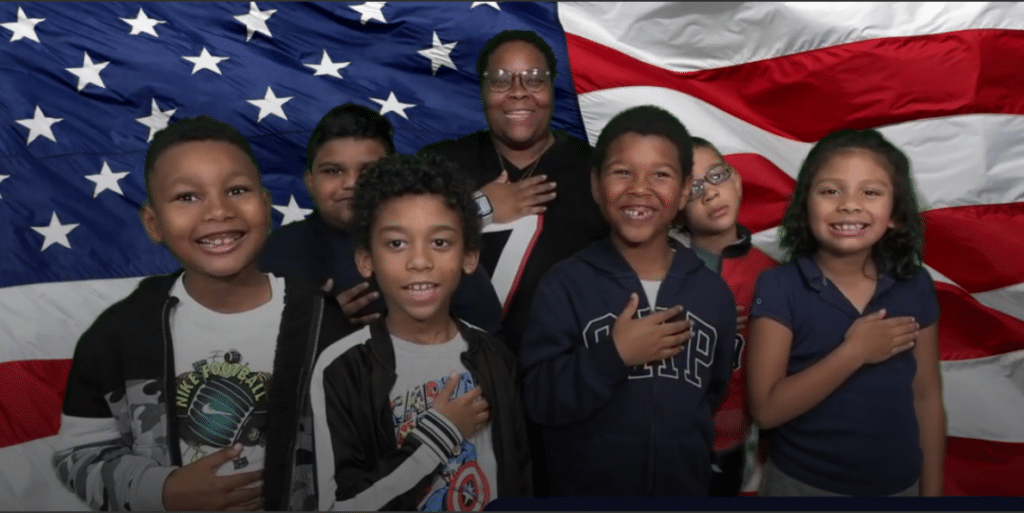
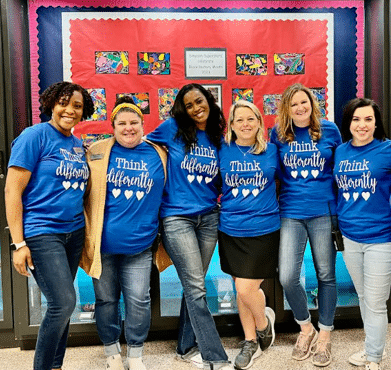
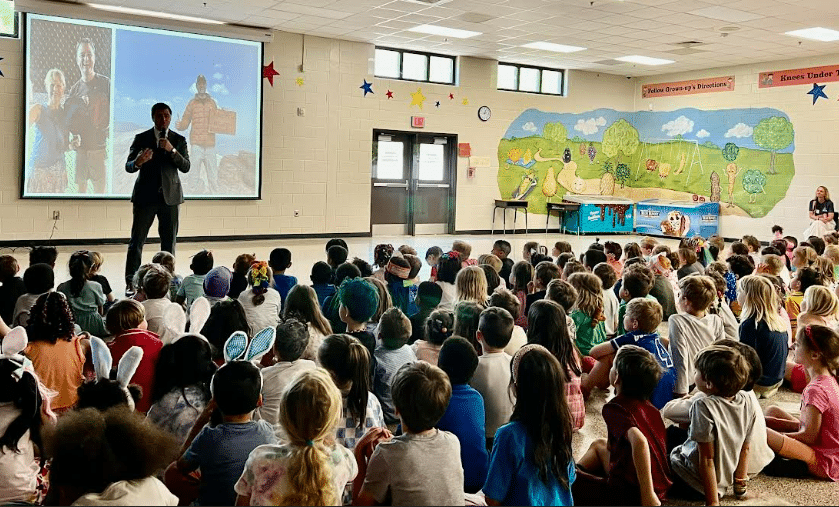
They highlighted each day of the week on the morning news with fun facts about notable people in society — and throughout history — who have overcome challenges with their disabilities, including actor Daniel Radcliffe (who has lived with dyspraxia for his entire life), Tom Cruise, Whoopi Goldberg, Frida Kahlo and Helen Keller.
Simpson Elementary’s technology team also pre-recorded various special needs classes reciting the Pledge of Allegiance every day of the week.
Guest speaker
To end their ECW with a bang, they invited former Simpson Elementary parent, State Representative Scott Hilton, to come in and speak to their K-2 classes about raising his son, Chase (who is autistic and now a student at Norcross High School), and how being different is okay.
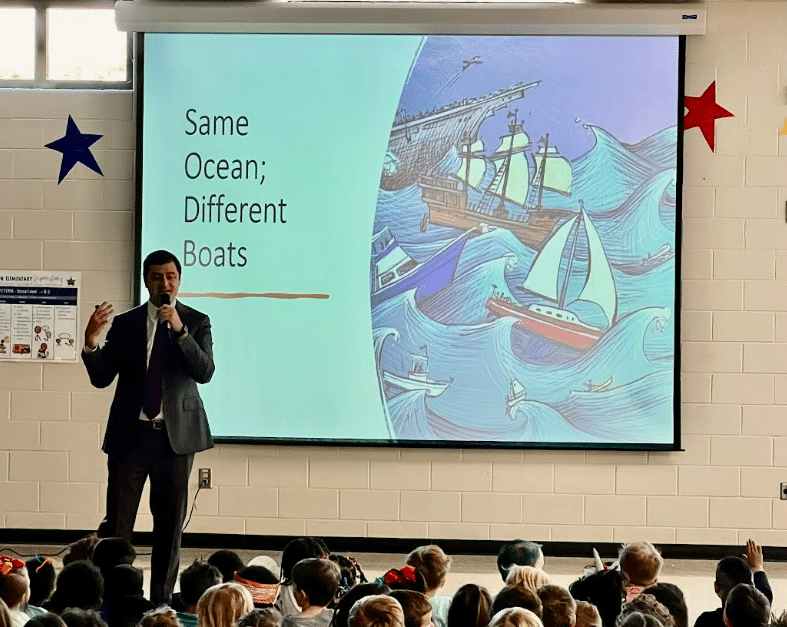
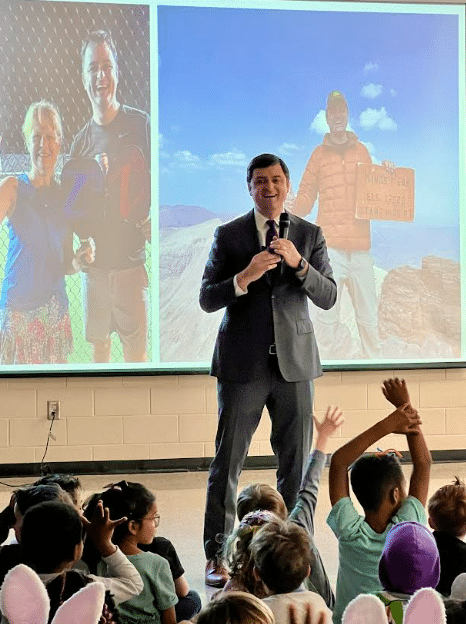
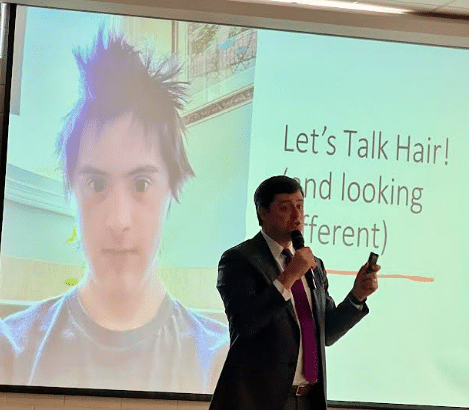
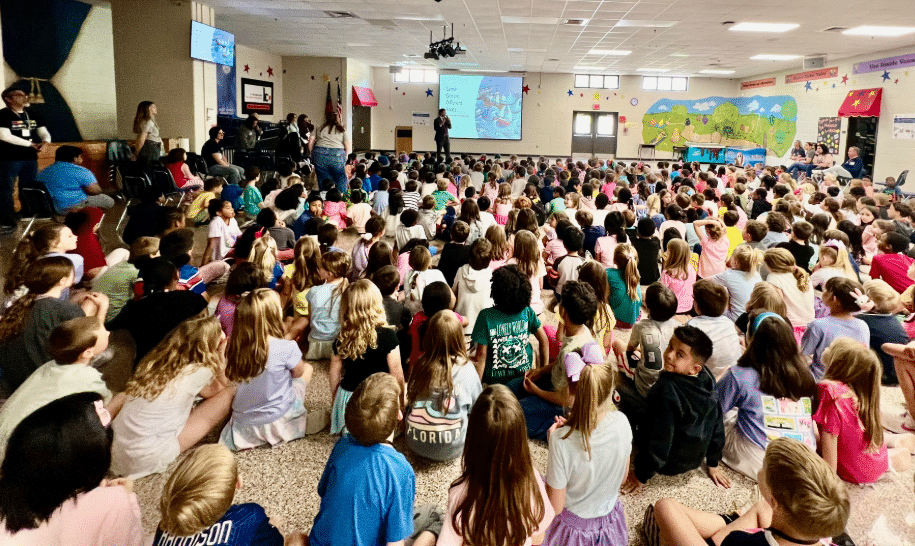
“Showing kindness and being inclusive is the best version of humanity,” said Dr. Taffeta Connery, Simpson Elementary School principal, in a statement about the event.
“Simpson Elementary has a special needs population of 214 (23%) of 946 students. [And] … we strive to ensure that our students are valued, recognized and instilled with high expectations for all.”
For more about Simpson Elementary, visit simpsones.gcpsk12.org.
Related
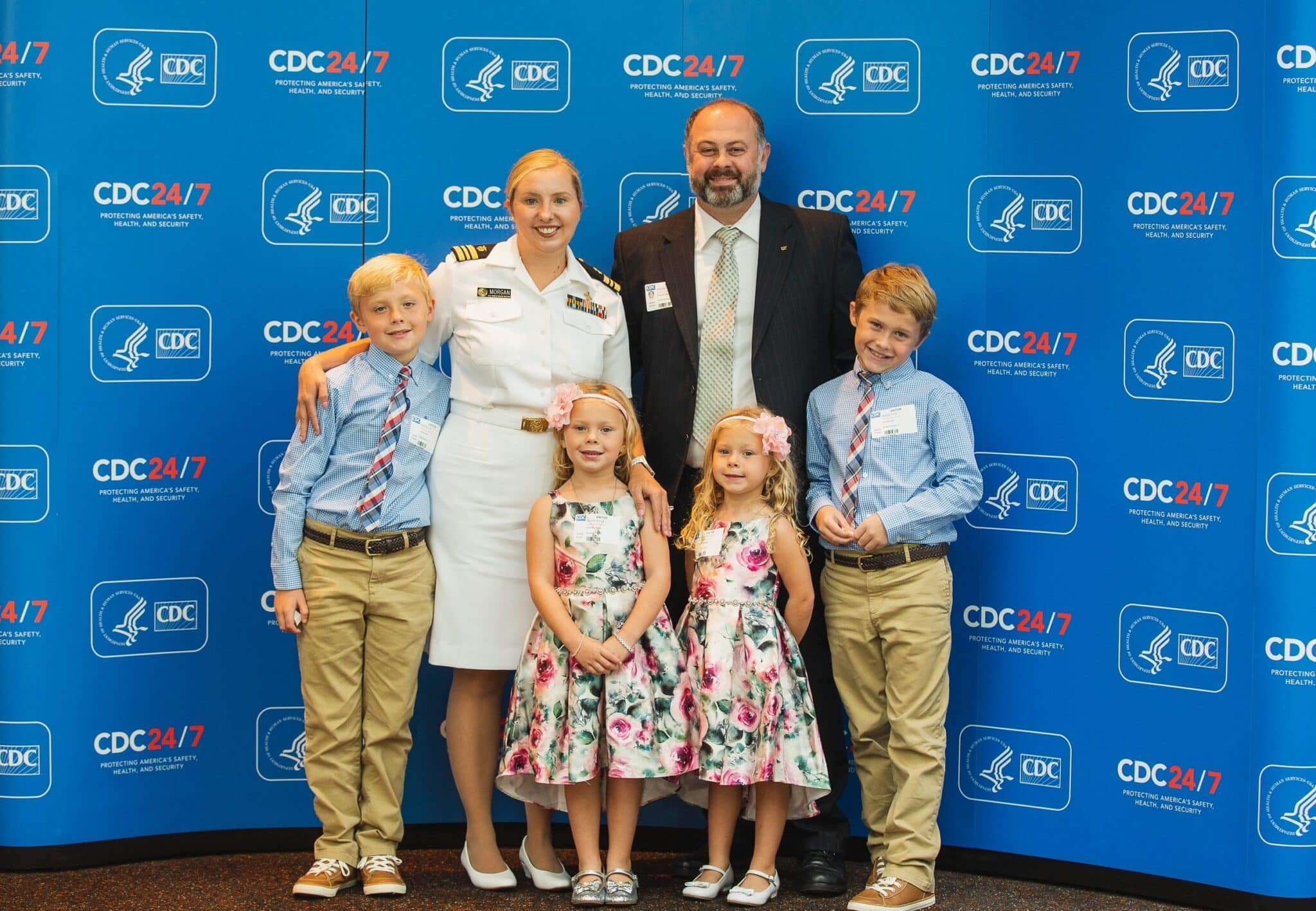
Motherhood comes with a lot of moving parts. For these Peachtree Corners moms, it also means leading teams, building careers and keeping the family schedule running. Most days, all at once.
This Mother’s Day, we’re spotlighting seven women in our community who are doing just that. They’re professionals in full-time leadership roles, showing up to strategy meetings by day and soccer games by night. They’re problem-solvers, planners, caregivers and coaches.
What connects them most isn’t just what they do, it’s how they do it. With intention. With humor. With support from partners, parents, friends and neighbors. And with a deep appreciation for the community they’ve built in Peachtree Corners.
Through their stories, we celebrate more than titles and to-do lists. We honor the quiet, constant work of showing up.
Tracy Lee
Tracy Lee leads with heart and vision as CEO of This Dot Labs, a software consultancy focused on helping businesses solve complex challenges through technology. Her engineering leaders collaborate with major clients like Stripe, DocuSign, Google, Wikipedia and Roblox. She’s passionate about her work.
“I love the mix of problem-solving and people leadership and knowing the work we do can make a real-world impact,” she said.
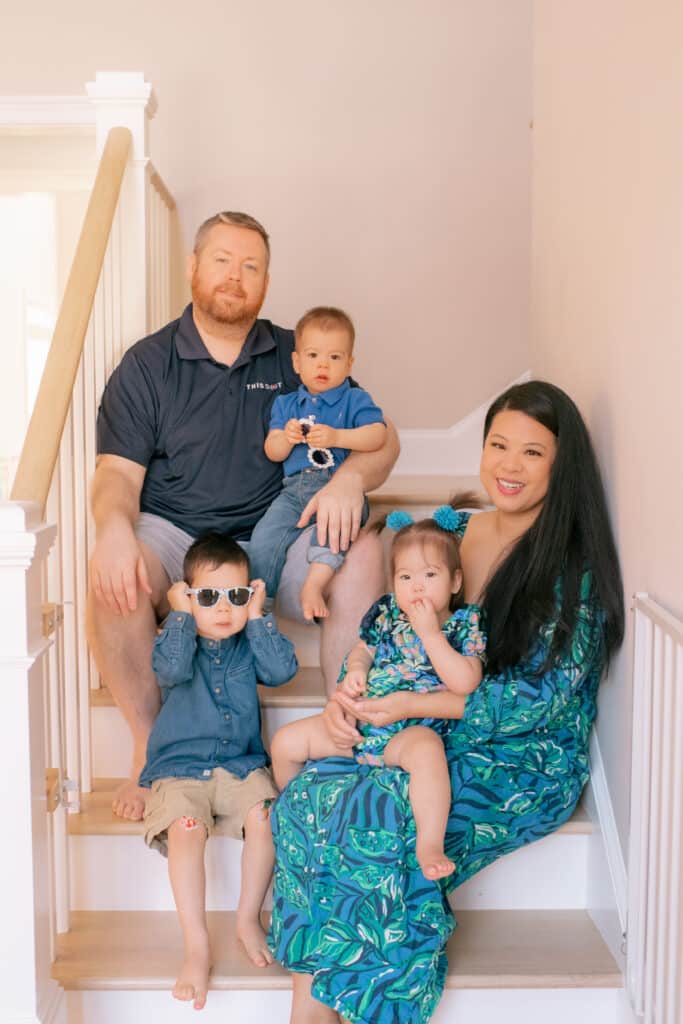
Tracy brings that same intentionality to her life at home, where she and her husband, Elliott Fouts, are raising three young children: William, 3, and twins Angelina and Marcus, who are 1.5. Despite the busy pace, Tracy is committed to being present in every role she plays.
“I have three full-time nannies and two part-time nannies, as well as girls around the neighborhood who are mama’s helpers to manage the chaos! With the help, we are able to do more and enjoy more time with our kids,” she said. “I try to be fully present, whether I’m in a meeting or building block towers in the living room. It’s never perfect, but we focus on what matters most in the moment.”
Tracy credits her support system for making it all possible. “I have an incredible partner and a strong support system between our nannies, friends and local community,” she said. “We have a local moms group for Asian moms called Georgia Asian Moms, and there are so many moms just in our neighborhood. It’s really great.”
Peachtree Corners has become a meaningful home base for the family. “We absolutely love it here,” she said. “There’s amazing programming for kids at The Forum every Tuesday in the spring and summer. It’s such a gem for young families.”
Weekends often include time outside and community adventures. “Sometimes the best hack is just piling everyone in the wagon and heading out for fresh air!” she said.
Tracy leans on a strong partner, a tight-knit group of friends and a local moms network. “It really takes a village,” she shared. “And I feel lucky to have one.”
Melissa Nicholson
Melissa Nicholson knows what it means to lead with heart and precision. As division vice president of program management & international solutions at Aya Healthcare, she helps internationally educated healthcare professionals enter the U.S. workforce.
“What I enjoy most is the opportunity to support these professionals in achieving their American dream,” she said. “While also contributing to improved patient outcomes across the country.”
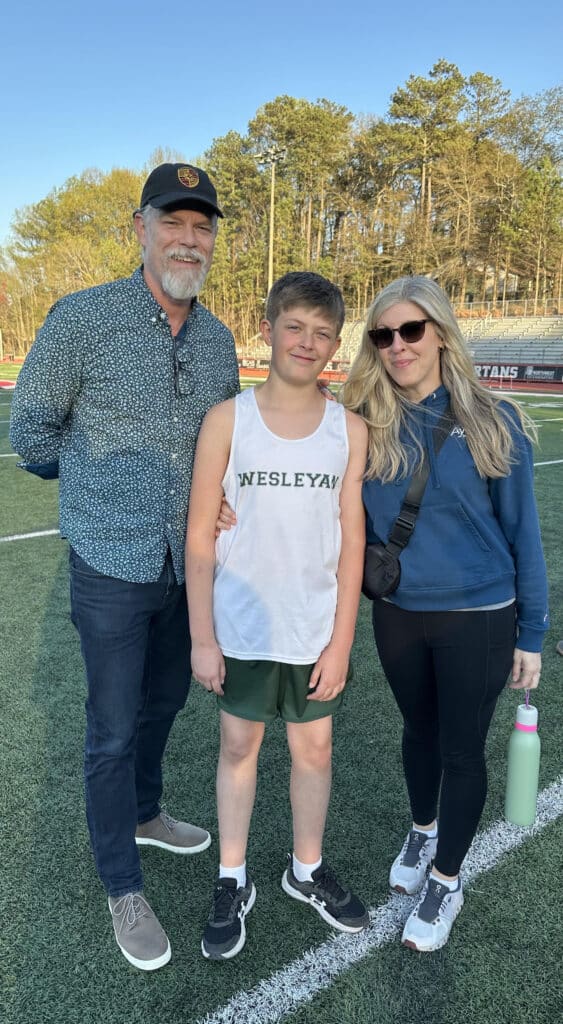
Melissa and her husband Greg recently celebrated 15 years of marriage. Their 12-year-old son, Luke, and a cat named Charlie bring a fun, loving dynamic of their own into the family. After relocating from East Atlanta a decade ago, they quickly embraced the Peachtree Corners community.
“It’s the people who make this community so special,” she said. “We’re truly grateful to count our neighbors as friends.”
Balancing an executive role with family life takes clarity and commitment. “I have to be very intentional with my time,” Melissa shared. She sets boundaries at work and makes sure her team knows when she’s off the clock for important family moments.
Wellness is a key part of her rhythm. “I recently started working out at Orangetheory Fitness,” she said. “I’ve noticed a significant boost in both energy and focus.” Sundays are for church and reflection.
When she travels for work, Greg holds it down at home. “We rely on each other to keep life running smoothly,” she said. “I’m grateful every day for that kind of partnership.”
On weekends, Melissa prioritizes quality time. Whether that’s a hike, pool day or baking something from scratch. “We’ve learned that if we don’t prioritize those moments, the weekends can quickly get taken over.”
Diva Hicks
For Diva Hicks, work isn’t just a job, it’s personal. As creative senior manager at CURE Childhood Cancer, her mission runs deep.
“At 12 years old, my sister was diagnosed with cancer,” she said. “CURE, in its early days, was a resource for my family.”

Her sister survived and now thrives. That experience shaped Diva’s career and continues to inspire her today. “This is my opportunity to give back to CURE for what it did for my family,” she said. “It’s rare to find a place where your purpose and passions collide.”
CURE also welcomes her whole family into the fold. “I get to bring my kids to events all the time,” she said. “They love feeling like they are a part of my work.”
Diva lives in Peachtree Corners with her husband John, their children Adair, 8, and Tripp, 6, and two golden doodles. “There is a sense of community here that I think is special,” she said.
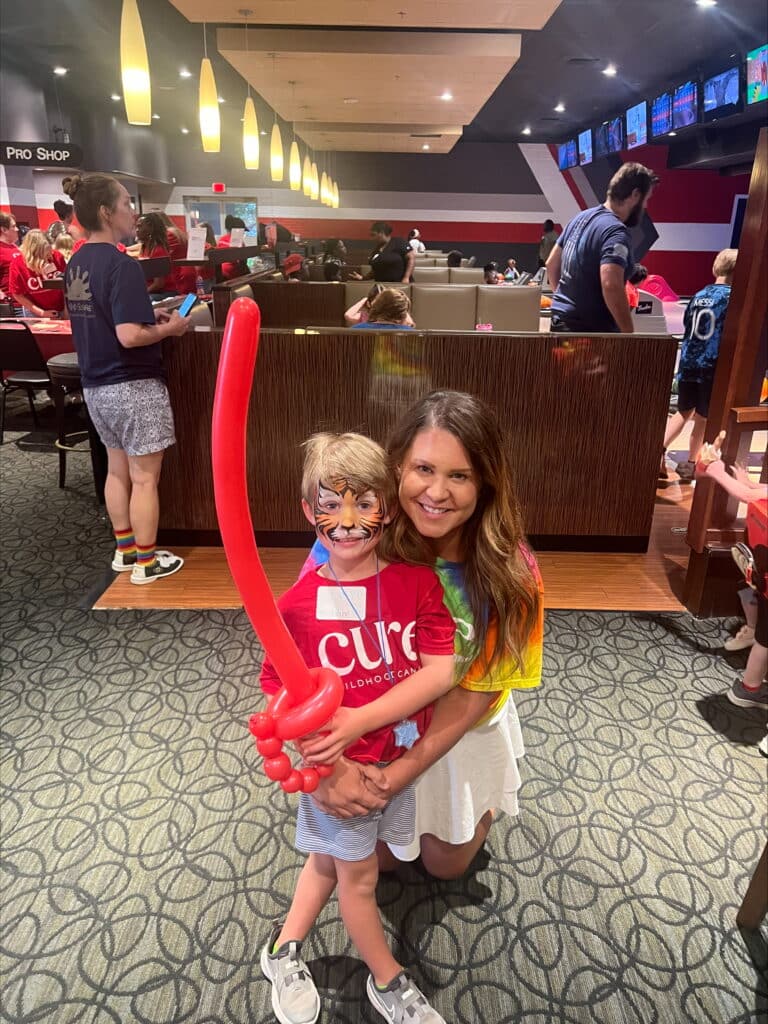
Balance is a daily effort. “John and I have tackled who helps with homework and on what days,” she said. “I would not be able to be the mom that I am without my village.”
She leads school committees and never misses events. “Is it easy? No,” she said. “But I honestly say, it’s not easy for any parent.”
Diva’s motivation is clear. “I want Adair to look at me and see that she can be a mom and have a career too.”
The family stays grounded with tennis weekends and careful planning. “We live by our calendar,” she said. “The more prepared I am, the easier life is.”
Kate Martin
Kate Martin knows how to bring structure to busy systems. As senior director of financial planning and analysis at Alloy Roofing, she finds energy in collaboration and clear strategy.
“In this role, I work closely with various teams across the business,” she said. “It supports the company’s strategy and performance.”
Kate and her husband, Nathan, are raising two children, 14-year-old Elliot and 10-year-old Evan, in Peachtree Corners. After ten years in the area, she credits the people for making it feel like home. “Life wouldn’t be the same without the relationships we’ve built here,” she said.
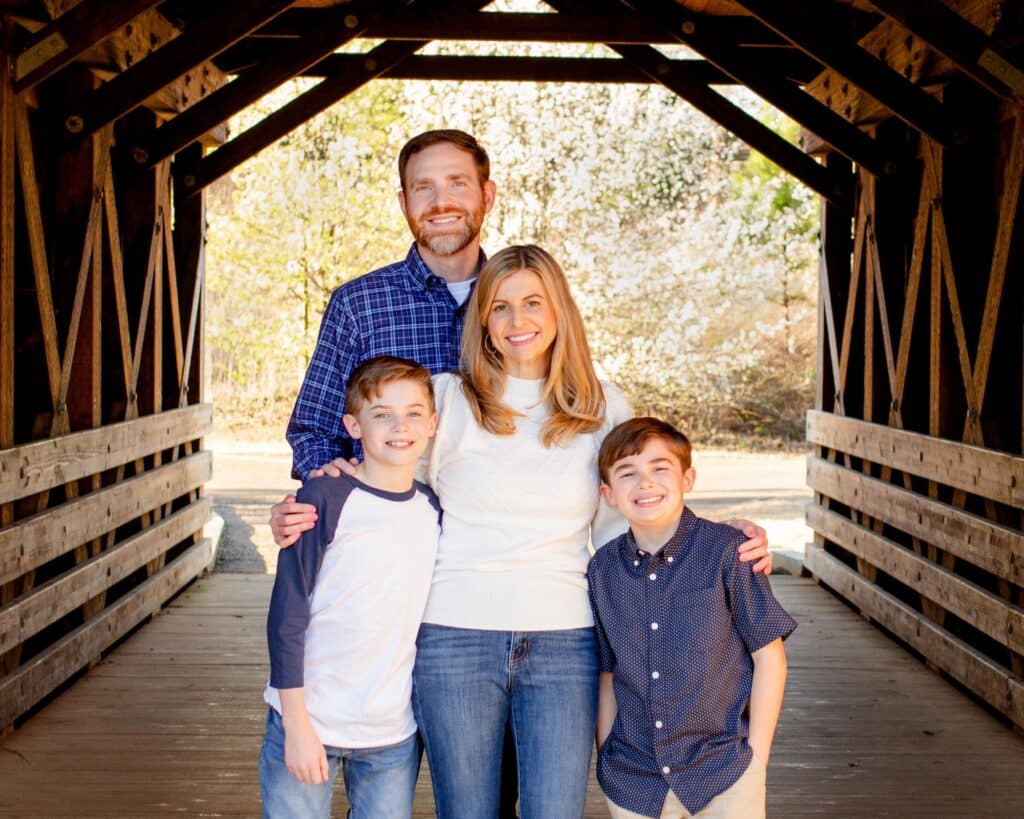
Balance starts with planning. “We keep a central Google calendar synced with all the family commitments that we review daily,” she said. “On Sundays we write on the kitchen boards.” Their chalkboard becomes the weekly roadmap, from meals to responsibilities.
“Seeing things laid out visually keeps me from overcommitting,” she added.
The family stays grounded by recognizing progress. “What keeps me motivated is celebrating both the big and small wins together,” she shared. “Sometimes, making it through the week is a victory in itself.”
Kate relies on a strong network. “We are very fortunate to have my parents nearby,” she said. “I also have an amazing network of women here in Peachtree Corners that I rely on.”
Her favorite hack? “An app Nathan created to help manage our calendars,” she said. “He created a solution to integrate these webcal subscriptions into a central subscription hub.” It’s called Skedj, and they’re piloting it now. “If you know this struggle and want to help us pilot the app, check out skedj.co!”
Linda Luna
As vice president at RSUI, Linda Luna manages risk while empowering people. She leads a team of underwriters who handle professional liability and cyber insurance. “I really enjoy my job because of its dynamic nature and the opportunity to help people in meaningful ways,” she said.
Whether she’s mentoring her team or protecting clients’ businesses, Linda finds value in impact. “It’s rewarding to know that my work has a positive impact on both my colleagues and our clients.”

She and her husband, Ruben, are raising their two children, Dawson, 10, and Ava, 6, in Peachtree Corners. Her parents, though not under the same roof, are a constant part of daily life. “They help keep things running smoothly on the home front,” she said.
After nine years in the community, Linda has grown to love its blend of charm and convenience. “There is always something to do,” she said. “Whether it’s grabbing a bite at Ted’s or spending time with friends at Town Center.”
Balance comes from structure. “By establishing a solid schedule and sticking to it, I can ensure that my work commitments are met,” she said. “Being fully present allows me to strengthen my connection with my loved ones.”
When things get busy, she takes a practical approach. “Breaking it down into smaller, manageable tasks makes it much more approachable,” she said. “I remind myself to keep the bigger picture in mind and not sweat the small stuff.”
Linda’s support system is strong. “It truly takes a village, and I’m so grateful for mine,” she said. The family’s favorite tradition? A beach trip to 30A every May. “It’s our way of unwinding, reconnecting and making lasting memories together.”
Allison Blasetti
Allison Blasetti holds a national leadership role at Transamerica in the employee benefits division — a position that constantly challenges and motivates her. “What I enjoy most is the opportunity to use my talents to help my team,” she said. “I’m always growing and learning.”
She and her husband, John, are raising daughters Annie Mae, 8, and Olive, 6, in Peachtree Corners, where they’ve built strong ties in the community. “The amenities in our city provide many opportunities to run into friends around town or plan meet-ups,” she said.

Allison works from home and prioritizes clear boundaries. “I turn off my app notifications because it quickly pulls me back in to work,” she said. “I also have a dedicated workspace in my house where I can leave at the end of the workday.”
She’s developed the habit of resetting her mindset, as well. “I quickly recognize [when] I’m mentally ‘at work’ and actively redirect my thoughts back to being in the present moment.”
Allison’s mornings begin at Burn Bootcamp, where she finds motivation and connection. “Spending an hour with my Burn community helps me get grounded for the day,” she said.
To stay organized, she and her husband use a shared family calendar. Her mom steps in often, especially when work travel ramps up. “I really don’t know what we would do without her.”
On weekends, Allison coaches Olive’s soccer team with the Peachtree Corners Football Club. “It brings me so much joy to be outside, see my soccer friends and watch my girls have fun,” she said. “Coaching makes it even better because I get to support the community that means a lot to me.”
Samantha Morgan
Samantha Morgan is a commander in the U.S. Public Health Service, currently assigned to the Centers for Disease Control and Prevention. Over her career, she’s responded to major public health threats, including Ebola, Zika and COVID-19. Today, her work centers on injury prevention, with a focus on issues like suicide, drowning and traumatic brain injury.
“What I enjoy most is being part of CDC’s mission to save lives and protect people,” she said. “I’m proud to contribute to work that makes a tangible difference in communities across the country.”
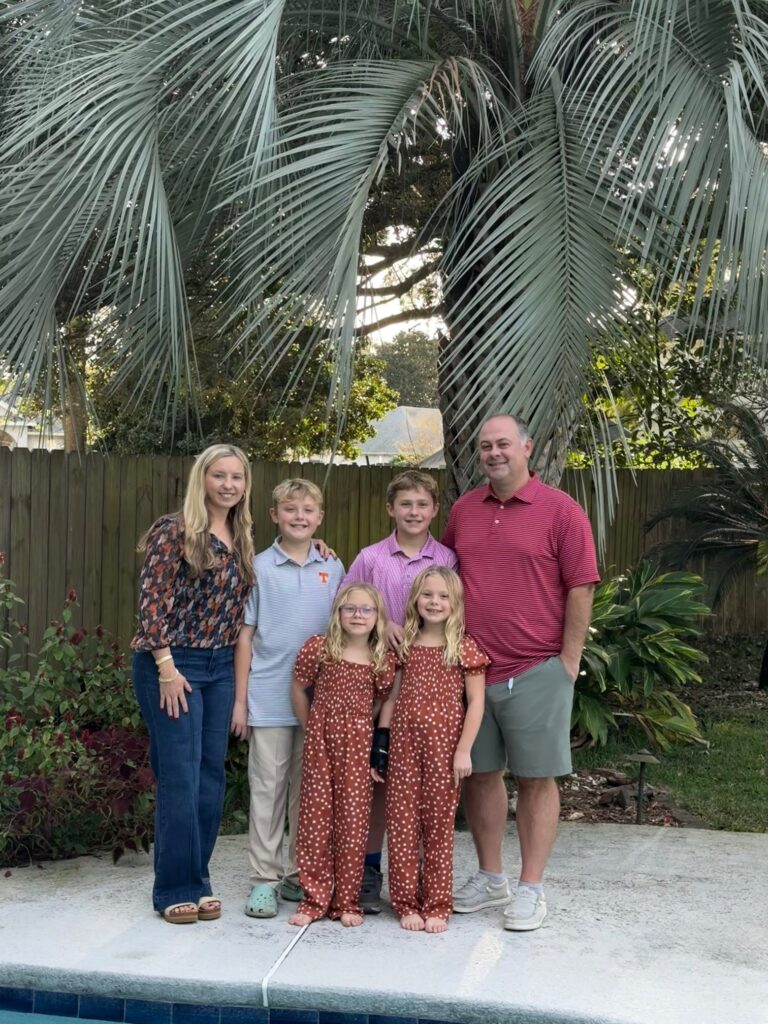
At home in Peachtree Corners, Samantha and her husband, Brian, are raising two sets of twins. Luke and Elliot are 12-years-old and love baseball, golf, basketball and band. Charlotte and Noelle are 8-years-old and enjoy piano, tumbling and tennis. “Life with four kids is wonderfully busy,” she said. “I often joke that I’m an unpaid Uber driver!”
After more than a decade in the neighborhood, Samantha credits their support system for helping them manage the day-to-day. “Our neighbors and friends — our village — have supported us through the hardest moments and celebrated life’s greatest joys with us,” she said.
Structure is key to keeping things on track. “We live and breathe by our family calendar,” she said. “Shared schedules, group texts and carpooling help us keep things running.”
Her children remain Samantha’s biggest motivators. “They know, ‘mom’s going to work to help make the world a safer place,’” she said.
The family also leans on routines and simple joys. “Checklists are my go-to mom hack,” she shared. One of their favorite traditions is make-your-own-pizza night. “It’s messy, silly and something we all genuinely look forward to.”
The seven women featured here offer a glimpse into the lives of working moms in Peachtree Corners. Each one balances career, family and community with care and intention. They are just a few of the many women — both working and stay-at-home — who nurture, organize and uplift the people around them every day.
Whether leading teams or guiding their children, mothers across this community show up with strength, love and quiet determination.
You’ll find this story in the May/June issue of Peachtree Corners Magazine, available in print and digital edition.
Related
City of Peachtree Corners
Official City Merchandise Line Debuts This Saturday at Town Green
Published
3 days agoon
May 6, 2025
This Saturday, May 10, residents and visitors are invited to experience the debut of Peachtree Corners’ official merchandise collection at the Town Green. The pop-up shop will be open all day, beginning at 8 a.m., located directly behind the former Jinbei restaurant.
This pop-up shop is provided through a pilot program with Vox-pop-uli and the City of Peachtree Corners.

“We’re thrilled to showcase our city’s spirit through this exciting new merchandise line,” said Louis Svehla, City of Peachtree Corners director of communications. “There’s something for everyone, whether you’re a proud local or just visiting. We are excited about testing this pilot program to raise funds for continued improvements at Town Green and events.”
Featured items include:
- brand new concert-themed apparel
- city-branded merchandise
- limited edition collectibles
- perfect Mother’s Day gift selections
With Mother’s Day approaching, shoppers will find unique, locally inspired gifts guaranteed to delight mom with something she doesn’t already own.

Visitors can browse and purchase items throughout the day, with friendly staff available to assist with selections.
Event details
Date: Saturday, May 10
Time: Starting at 8 a.m.
Location: Town Green (behind former Jinbei location)
Payment methods accepted: Cash and credit card accepted
Related
Read the Digital Edition
Subscribe
Keep Up With Peachtree Corners News
Join our mailing list to receive the latest news and updates from our team.
You have Successfully Subscribed!

GA Tech Launches First-of-its-Kind GT Atrium in Peachtree Corners

Katherine Lafourcade — A Journey of Passion, Resilience and Giving Back

Digital Edition

PCBA Announces 2025 Scholarship Winner

Paul Duke STEM High School Student Earns CGO Scholarship

World Blood Donor Day Starts Here: Theo’s Miracle, Katherine’s Mission [Podcast]

Peachtree Corners Grows Business Opportunities Through Economic Development

Official City Merchandise Line Debuts This Saturday at Town Green

Simpson Elementary Marks Exceptional Children’s Week

Executive Function: A Tribute to Working Moms

Official City Merchandise Line Debuts This Saturday at Town Green

Peachtree Corners Grows Business Opportunities Through Economic Development

Digital Edition

World Blood Donor Day Starts Here: Theo’s Miracle, Katherine’s Mission [Podcast]

Paul Duke STEM High School Student Earns CGO Scholarship

PCBA Announces 2025 Scholarship Winner

Light up the Corners [Video]

Capitalist Sage: Business Leadership in Your Community [Podcast]

Cliff Bramble: A Culinary Adventure through Italy

Top 10 Brunch Places in Gwinnett County

A Hunger for Hospitality

THE CORNERS EPISODE 3 – BLAXICAN PART 1

Top 10 Indoor Things To Do This Winter

The ED Hour: What it takes to Remove Barriers from Education

Peachtree Corners Life
Topics and Categories
Trending
-
Digital Edition5 days ago
Digital Edition
-
Podcast5 days ago
World Blood Donor Day Starts Here: Theo’s Miracle, Katherine’s Mission [Podcast]
-
Business3 days ago
Peachtree Corners Grows Business Opportunities Through Economic Development
-
City of Peachtree Corners3 days ago
Official City Merchandise Line Debuts This Saturday at Town Green








